TED演讲分享
ted经典励志英文演讲稿(通用10篇)

ted经典励志英文演讲稿ted经典励志英文演讲稿(通用10篇)演讲稿是在一定的场合,面对一定的听众,演讲人围绕着主题讲话的文稿。
在现实社会中,我们都可能会用到演讲稿,那么,怎么去写演讲稿呢?下面是小编精心整理的ted经典励志英文演讲稿,欢迎大家分享。
ted经典励志英文演讲稿篇1Dear:Imagine a big explosion as you climb through 3,000 ft. Imagine a plane full of smoke. Imagine an engine going clack, clack, clack, clack, clack, clack, clack. It sounds scary.想像一个大爆炸,当你在三千多英尺的高空;想像机舱内布满黑烟,想像引擎发出喀啦、喀啦、喀啦、喀啦、喀啦的声响,听起来很可怕。
Well I had a unique seat that day. I was sitting in 1D. I was the only one who can talk to the flight attendants. So I looked at them right away, and they said, "No problem. We probably hit some birds." The pilot had already turned the plane around, and we werent that far. You could see Manhattan.那天我的位置很特別,我坐在1D,我是唯一可以和空服员说话的人,于是我立刻看着他们,他们说,“没问题,我们可能撞上鸟了。
” 机长已经把机头转向,我们离目的地很近,已经可以看到曼哈顿了。
Two minutes later, 3 things happened at the same time. The pilot lines up the plane with the Hudson River. Thats usually not the route. He turns off the engines. Now imagine being in a plane with no sound. And then he says 3 words-the most unemotional 3 words Ive ever heard. He says, "Brace for impact."两分钟以后,三件事情同时发生:机长把飞机对齐哈德逊河,一般的航道可不是这样。
ted演讲稿4篇_演讲稿
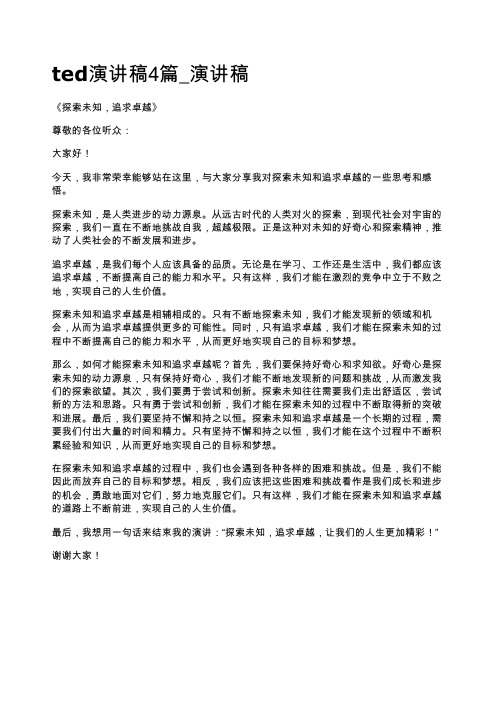
ted演讲稿4篇_演讲稿《探索未知,追求卓越》尊敬的各位听众:大家好!今天,我非常荣幸能够站在这里,与大家分享我对探索未知和追求卓越的一些思考和感悟。
探索未知,是人类进步的动力源泉。
从远古时代的人类对火的探索,到现代社会对宇宙的探索,我们一直在不断地挑战自我,超越极限。
正是这种对未知的好奇心和探索精神,推动了人类社会的不断发展和进步。
追求卓越,是我们每个人应该具备的品质。
无论是在学习、工作还是生活中,我们都应该追求卓越,不断提高自己的能力和水平。
只有这样,我们才能在激烈的竞争中立于不败之地,实现自己的人生价值。
探索未知和追求卓越是相辅相成的。
只有不断地探索未知,我们才能发现新的领域和机会,从而为追求卓越提供更多的可能性。
同时,只有追求卓越,我们才能在探索未知的过程中不断提高自己的能力和水平,从而更好地实现自己的目标和梦想。
那么,如何才能探索未知和追求卓越呢?首先,我们要保持好奇心和求知欲。
好奇心是探索未知的动力源泉,只有保持好奇心,我们才能不断地发现新的问题和挑战,从而激发我们的探索欲望。
其次,我们要勇于尝试和创新。
探索未知往往需要我们走出舒适区,尝试新的方法和思路。
只有勇于尝试和创新,我们才能在探索未知的过程中不断取得新的突破和进展。
最后,我们要坚持不懈和持之以恒。
探索未知和追求卓越是一个长期的过程,需要我们付出大量的时间和精力。
只有坚持不懈和持之以恒,我们才能在这个过程中不断积累经验和知识,从而更好地实现自己的目标和梦想。
在探索未知和追求卓越的过程中,我们也会遇到各种各样的困难和挑战。
但是,我们不能因此而放弃自己的目标和梦想。
相反,我们应该把这些困难和挑战看作是我们成长和进步的机会,勇敢地面对它们,努力地克服它们。
只有这样,我们才能在探索未知和追求卓越的道路上不断前进,实现自己的人生价值。
最后,我想用一句话来结束我的演讲:“探索未知,追求卓越,让我们的人生更加精彩!”谢谢大家!。
ted最受欢迎的25个演讲稿

ted最受欢迎的25个演讲稿TED 最受欢迎的 25 个演讲稿TED 演讲作为全球知名的思想分享平台,汇聚了来自各个领域的杰出人物,他们通过精彩的演讲,传递着深刻的见解、创新的理念和感人的故事。
以下为您介绍其中最受欢迎的 25 个演讲稿:1、《学校如何扼杀创造力》(Ken Robinson)肯·罗宾逊在这个演讲中深刻地指出了传统教育体制对创造力的扼杀。
他强调,创造力如同人的智力一样重要,而我们的教育系统往往更注重学术成绩,而忽视了培养学生的创造力。
2、《脆弱的力量》(Brené Brown)布琳·布朗探讨了脆弱的力量。
她认为,敢于展现脆弱并非弱点,而是一种勇气和连接人与人的关键。
3、《肢体语言塑造你自己》(Amy Cuddy)艾米·卡迪通过研究表明,肢体语言不仅能反映我们的内心状态,还能反过来塑造我们的心态和表现。
4、《伟大的领导者如何激励行动》(Simon Sinek)西蒙·斯涅克提出了“黄金圈法则”,解释了伟大的领导者是如何从“为什么”开始,激励人们采取行动的。
5、《内向性格的力量》(Susan Cain)苏珊·凯恩为内向者发声,她认为内向并非缺陷,而是一种独特的力量,社会应该给予内向者更多的理解和空间。
6、《我们为什么快乐》(Dan Gilbert)丹·吉尔伯特探讨了人类的快乐机制,他指出我们对于快乐的预测往往是不准确的,而适应和心理免疫系统在其中起着重要作用。
7、《你的记忆怎样欺骗了你》(Elizabeth Loftus)伊丽莎白·洛夫特斯揭示了记忆的不可靠性,以及外界因素如何影响和扭曲我们的记忆。
8、《用游戏创造一个更美好的世界》(Jane McGonigal)简·麦戈尼格尔阐述了游戏的积极作用,以及如何利用游戏来解决现实世界的问题,创造更美好的未来。
9、《成功的 8 个秘诀》(Richard St John)理查德·圣约翰总结了多年研究得出的成功的 8 个秘诀,这些秘诀涵盖了坚持、热情、努力等多个方面。
TED英语演讲稿(优秀6篇)

TED 英语演讲稿 (优秀 6 篇)演讲稿特别注重结构清楚,层次简明。
在我们平凡的日常里,演讲稿对我们的。
作用越来越大,为了让您在写演讲稿时更加简单方便,下面是我为大伙儿带来的6 篇《TED 英语演讲稿》,我们不妨阅读一下,看看是否能有一点抛砖引玉的作用。
We're going to go on a dive to the deep sea, and anyone that's had that lovely opportunity knows that for about two and half hours on the way down, it's a perfectly positively pitch—black world。
And we used to see the most mysterious animals out the windowthat you couldn't describe: these blinking lights —— a world of bioluminescence, like fireflies。
Dr。
Edith Widder —— she's now at the Ocean Research and Conservation Association ——was able to come up with a camera that could capture some of these incredible animals, and that's what you're seeing here on the screen。
好了,我们即将潜入海底深处。
任何一个有过这种美妙机会的人都知道在这两个半小时的下降过程中,是一个完全漆黑的世界。
我们透过窗户会看见世界上各种最神秘的动物,各种无法形容的动物。
经典TED英语演讲稿范文五篇

经典TED英语演讲稿范文五篇在英语学习的过程,大家想要尽可能的提高英语水平的话,进行英语演讲不仅是对自己水平的测验,同时也是对自己英语水平提高的做法,下面是小编给大家整理的经典TED英语演讲稿范文五篇,欢迎大家借鉴与参考,希望对大家有所帮助。
TED英文演讲稿3篇ted演讲稿5篇精选TED英文演讲稿3篇(5)TED英语演讲:真正的强大TED英文演讲稿3篇(3)TED英语演讲稿1I think the cause is more complicated. I think, as a society, we put more pressure on our boys to succeedthan we do on our girls.I know men that stay home and work in the home to support wives with careers,and it's hard. When I go to the Mommy-and-Me stuff and I see the father there, I notice that the other mommies don't play with him. And that's a problem, because we have to make it as important a job,because it's the hardest job in the world to work inside the home, for people of both genders, if we're going to even things out and let women stay in the workforce. Studies show that households with equal earning and equal responsibility also have half the divorce rate.And if that wasn't good enough motivation for everyone out there, they also have more — how shall I say this on this stage?TED英语演讲稿2They know each other more in the biblical sense as well. Message number three: Don't leave before you leave. I think there's a really deep irony to the fact that actions women are taking —and I see this all the time —with the objective ofstaying in the workforceactually lead to their eventually leaving. Here's what happens: We're all busy. Everyone's busy. A woman's busy. And she starts thinking about having a child, and from the moment she starts thinking about having a child, she starts thinking about making room for that child. "How am I going to fit this into everything else I'm doing?" And literally from that moment, she doesn't raise her hand anymore, she doesn't look for a promotion, she doesn't take on the new project, she doesn't say, "Me. I want to do that." She starts leaning back.TED英语演讲稿3The problem is that — let's say she got pregnant that day, that day — nine months of pregnancy, three months of maternity leave, six months to catch your breath — Fast-forward two years, more often — and as I've seen it — women start thinking about this way earlier — when they get engaged, or married, when they start thinking about having a child, which can take a long time. One woman came to see me about this. She looked a little young. And I said, "So are you and your husband thinking about having a baby?" And she said, "Oh no, I'm not married." She didn't even have a boyfriend.TED英语演讲稿4I said, "You're thinking about this just way too early." But the point is that what happens once you start kind of quietly leaning back? Everyone who's been through this — and I'm here to tell you, once you have a child at home, your job better be really good to go back, because it's hard to leave that kid at home. Your job needs to be challenging. It needs to be rewarding. You need to feel like you're making a difference. And if two years ago you didn't take a promotion and some guy next to you did, if three years ago you stopped looking for new opportunities,you'regoing to be bored because you should have kept your foot on the gas pedal. Don't leave before you leave. Stay in. Keep your foot on the gas pedal, until the very day you need to leave to take a break for a child — and then make your decisions. Don't make decisions too far in advance, particularly ones you're not even conscious you're making.TED英语演讲稿5My generation really, sadly, is not going to change the numbers at the top. They're just not moving. We are not going to get to where 50 percent of the population — in my generation, there will not be 50 percent of [women] at the top of any industry. But I'm hopeful that future generations can. I think a world where half of our countries and our companies were run by women, would be a better world. It's not just because people would know where the women's bathrooms are, even though that would be very helpful.I think it would be a better world. I have two children.I have a five-year-old son and a two-year-old daughter. I want my son to have a choice to contribute fully in the workforce or at home, and I want my daughter to have the choice to not just succeed, but to be liked for her accomplishments.。
名人ted演讲集

名人ted演讲集ted演讲在风靡全球,这样一个充满思想交汇的地方为什么会让大家如此关注,小编认为,多半是因为对于未知的好奇与渴望或是对知识的欲望,本文(名人ted演讲集)由整理,欢迎阅读。
【名人ted演讲集(一)】丘吉尔说:成功的秘诀就是:坚持、坚持、再坚持股神”巴菲特成功的秘诀:耐力胜过脑力朱熹:立志不坚,终不济事。
毛泽东:苟有恒,何必三更起五更眠;最无益,只怕一日曝十日寒…….这样的名言警句我年青时背过不少,但回头想想,什么也没有坚持下来什么,除了每天看两三个TED演讲坚持了多年,并通过TEDtoChina分享给更多人,算来现在也有一千多个演讲了,从个人开拓视野,思考新知的角度来说,这是一种成功。
关于意志力、持久心对于『成功』的影响大多是一两句的泛泛而谈,很少有人从心理学或者统计学上做深入研究。
在XX年的TED教育专题上Angela Lee就分享了她在这方面的研究。
Angela在27岁时辞去很悲催的管理咨询工作,转而到纽约公立学校教七年级数学。
她发现最好和最差学生的差异并不仅仅是智商,坚韧的性格起很大作用,几年的教学经验使她相信:我们的教育所需要的是一种对学生、对学习更好的理解——从动机的角度、从心理的角度去理解,而不仅仅是智商单一的维度。
后来Angela继续她的心理学博士学习,研究儿童与成人在各种艰巨挑战中的表现,看谁会成功?为什么会成功?她和研究团队去西点军校,尝试预测哪些学员能通过军事训练,哪些会放弃;去看全国拼字比赛,预测哪些孩子能在比赛中笑到最后;研究在非常艰苦的环境下工作的新教师,预测哪些教师能坚持这份职业,预测哪些教师教出的学生成绩的提高最为显著;她和公司合作预测哪些销售人员能保住饭碗?谁能赚最多钱?……在不同的背景下,她发现意志力指标是观测重点,而非社交能力、美丽的外貌、健康的身体,更不是智商。
意志力是什么?是面对长远目标时的热情和毅力,是有耐力的表现,是日复一日依然对未来坚信不已——不只是这周、不只是这个月,而是年复一年地用心、努力工作来实现所坚信的那个未来。
ted英语演讲稿范文4篇_演讲稿

ted英语演讲稿范文4篇简介:受教育的机会并非人人都有,而在学校的孩子们是否都能学有所成?英国学校教育咨询师sir ken robinson 幽默演讲,如何逃出教育的“死亡谷“? 告诉我们如何以开放的文化氛围培育年轻的一代。
thank you very much.i moved to america 12 years ago with my wife terry and our two kids. actually, truthfully, we moved to los angeles -- (laughter) -- thinking we were moving to america, but anyway, it's a short plane ride from los angeles to america.i got here 12 years ago, and when i got here, i was told various things, like, "americans don't get irony." have you come across this idea? it's not true. i've traveled the whole length and breadth of this country. i have found no evidence that americans don't get irony. it's one of those cultural myths, like, "the british are reserved." i don't know why people think this. we've invaded every country we've encountered. (laughter) but it's not true americans don't get irony, but i just want you to know that that's what people are saying about you behind your back. you know, so when you leave living rooms in europe, 1 / 55people say, thankfully, nobody was ironic in your presence. but i knew that americans get irony when i came across that legislation no child left behind. because whoever thought of that title gets irony, don't they, because -- (laughter) (applause) —because it's leaving millions of children behind. now i can see that's not a very attractive name for legislation: millions of children left behind. i can see that. what's the plan? well, we propose to leave millions of children behind, and here's how it's going to work.and it's working beautifully. in some parts of the country, 60 percent of kids drop out of high school. in the native american communities, it's 80 percent of kids. if we halved that number, one estimate is it would create a net gain to the u.s. economy over 10 years of nearly a trillion dollars. from an economic point of view, this is good math, isn't it, that we should do this? it actually costs an enormous amount to mop up the damage from the dropout crisis.but the dropout crisis is just the tip of an iceberg. what it doesn't count are all the kids who are in school but being disengaged from it, who don't enjoy it, who don't get any real benefit from it.2 / 55and the reason is not that we're not spending enough money. america spends more money on education than most other countries. class sizes are smaller than in many countries. and there are hundreds of initiatives every year to try and improve education. the trouble is, it's all going in the wrong direction. there are three principles on which human life flourishes, and they are contradicted by the culture of education under which most teachers have to labor and most students have to endure. the first is this, that human beings are naturally different and diverse.can i ask you, how many of you have got children of your own? okay. or grandchildren. how about two children or more? right. and the rest of you have seen such children. (laughter) small people wandering about. i will make you a bet, and i am confident that i will win the bet. if you've got two children or more, i bet you they are completely different from each other. aren't they? aren't they? (applause) you would never confuse them, would you? like, "which one are you? remind me. your mother and i are going to introduce some color-coding system, so we don't get confused."education under no child left behind is based on not 3 / 55diversity but conformity. what schools are encouraged to do is to find out what kids can do across a very narrow spectrum of achievement. one of the effects of no child left behind has been to narrow the focus onto the so-called stem disciplines. they're very important. i'm not here to argue against science and math. on the contrary, they're necessary but they're not sufficient. a real education has to give equal weight to the arts, the humanities, to physical education. an awful lot of kids, sorry, thank you —(applause) —one estimate in america currently is that something like 10 percent of kids, getting on that way, are being diagnosed with various conditions under the broad title of attention deficit disorder. adhd. i'm not saying there's no such thing. i just don't believe it's an epidemic like this. if you sit kids down, hour after hour, doing low-grade clerical work, don't be surprised if they start to fidget, you know? (laughter) (applause) children are not, for the most part, suffering from a psychological condition. they're suffering from childhood. (laughter) and i know this because i spent my early life as a child. i went through the whole thing. kids prosper best with a broad curriculum that celebrates their various talents, not just a small range of them.4 / 55and by the way, the arts aren't just important because they improve math scores. they're important because they speak to parts of children's being which are otherwise untouched.the second, thank you — (applause)the second principle that drives human life flourishing is curiosity. if you can light the spark of curiosity in a child, they will learn without any further assistance, very often. children are natural learners. it's a real achievement to put that particular ability out, or to stifle it. curiosity is the engine of achievement. now the reason i say this is because one of the effects of the current culture here, if i can say so, has been to de-professionalize teachers. there is no system in the world or any school in the country that is better than its teachers. teachers are the lifeblood of the success of schools. but teaching is a creative profession. teaching, properly conceived, is not a delivery system. you know, you're not there just to pass on received information. great teachers do that, but what great teachers also do is mentor, stimulate, provoke, engage. you see, in the end, education is about learning. if there's no learning going on, there's no education going on. and people can spend an awful lot of time discussing education 5 / 55without ever discussing learning. the whole point of education is to get people to learn.a friend of mine, an old friend -- actually very old, he's dead. (laughter) that's as old as it gets, i'm afraid. but a wonderful guy he was, wonderful philosopher. he used to talk about the difference between the task and achievement senses of verbs. you know, you can be engaged in the activity of something, but not really be achieving it, like dieting. it's a very good example, you know. there he is. he's dieting. is he losing any weight? not really. teaching is a word like that. you can say, "there's deborah, she's in room 34, she's teaching." but if nobody's learning anything, she may be engaged in the task of teaching but not actually fulfilling it. the role of a teacher is to facilitate learning. that's it. and part of the problem is, i think, that the dominant culture of education has come to focus on not teaching and learning, but testing. now, testing is important. standardized tests have a place. but they should not be the dominant culture of education. they should be diagnostic. they should help. (applause) if i go for a medical examination, i want some standardized tests. i do. you know, i want to know what my 6 / 55cholesterol level is compared to everybody else's on a standard scale. i don't want to be told on some scale my doctor invented in the car."your cholesterol is what i call level orange.""really? is that good?""we don't know."but all that should support learning. it shouldn't obstruct it, which of course it often does. so in place of curiosity, what we have is a culture of compliance. our children and teachers are encouraged to follow routine algorithms rather than to excite that power of imagination and curiosity. and the third principle is this: that human life is inherently creative. it's why we all have different résumés. we create our lives, and we can recreate them as we go through them. it's the common currency of being a human being. it's why human culture is so interesting and diverse and dynamic. i mean, other animals may well have imaginations and creativity, but it's not so much in evidence, is it, as ours? i mean, you may have a dog. and your dog may get depressed. you know, but it doesn't listen to radiohead, does it? (laughter) and sit staring out the window with a bottle of jack daniels. (laughter)and you say, "would you like to come for a walk?"7 / 55he says, "no, i'm fine. you go. i'll wait. but take pictures."we all create our own lives through this restless process of imagining alternatives and possibilities, and what one of the roles of education is to awaken and develop these powers of creativity. instead, what we have is a culture of standardization.now, it doesn't have to be that way. it really doesn't. finland regularly comes out on top in math, science and reading. now, we only know that's what they do well at because that's all that's being tested currently. that's one of the problems of the test. they don't look for other things that matter just as much. the thing about work in finland is this: they don't obsess about those disciplines. they have a very broad approach to education which includes humanities, physical education, the arts.second, there is no standardized testing in finland. i mean, there's a bit, but it's not what gets people up in the morning. it's not what keeps them at their desks.and the third thing, and i was at a meeting recently with some people from finland, actual finnish people, and somebody 8 / 55from the american system was saying to the people in finland, "what do you do about the dropout rate in finland?"and they all looked a bit bemused, and said, "well, we don't have one. why would you drop out? if people are in trouble, we get to them quite quickly and help them and we support them." now people always say, "well, you know, you can't compare finland to america."no. i think there's a population of around five million in finland. but you can compare it to a state in america. many states in america have fewer people in them than that. i mean, i've been to some states in america and i was the only person there. (laughter) really. really. i was asked to lock up when i left. (laughter)but what all the high-performing systems in the world do is currently what is not evident, sadly, across the systems in america -- i mean, as a whole. one is this: they individualize teaching and learning. they recognize that it's students who are learning and the system has to engage them, their curiosity, their individuality, and their creativity. that's how you get them to learn.the second is that they attribute a very high status to the 9 / 55teaching profession. they recognize that you can't improve education if you don't pick great people to teach and if you don't keep giving them constant support and professional development. investing in professional development is not a cost. it's an investment, and every other country that's succeeding well knows that, whether it's australia, canada, south korea, singapore, hong kong or shanghai. they know that to be the case.and the third is, they devolve responsibility to the school level for getting the job done. you see, there's a big difference here between going into a mode of command and control in education -- that's what happens in some systems. you know, central governments decide or state governments decide they know best and they're going to tell you what to do. the trouble is that education doesn't go on in the committee rooms of our legislative buildings. it happens in classrooms and schools, and the people who do it are the teachers and the students, and if you remove their discretion, it stops working. you have to put it back to the people. (applause)there is wonderful work happening in this country. but i have to say it's happening in spite of the dominant culture of 10 / 55education, not because of it. it's like people are sailing into a headwind all the time. and the reason i think is this: that many of the current policies are based on mechanistic conceptions of education. it's like education is an industrial process that can be improved just by having better data, and somewhere in, i think, the back of the mind of some policy makers is this idea that if we fine-tune it well enough, if we just get it right, it will all hum along perfectly into the future. it won't, and it never did.the point is that education is not a mechanical system. it's a human system. it's about people, people who either do want to learn or don't want to learn. every student who drops out of school has a reason for it which is rooted in their own biography. they may find it boring. they may find it irrelevant. they may find that it's at odds with the life they're living outside of school. there are trends, but the stories are always unique. i was at a meeting recently in los angeles of -- they're called alternative education programs. these are programs designed to get kids back into education. they have certain common features. they're very personalized. they have strong support for the teachers, close links with the community and 11 / 55a broad and diverse curriculum, and often programs which involve students outside school as well as inside school. and they work. what's interesting to me is, these are called "alternative education." you know? and all the evidence from around the world is, if we all did that, there'd be no need for the alternative. (applause)so i think we have to embrace a different metaphor. we have to recognize that it's a human system, and there are conditions under which people thrive, and conditions under which they don't. we are after all organic creatures, and the culture of the school is absolutely essential. culture is an organic term, isn't it?not far from where i live is a place called death valley. death valley is the hottest, driest place in america, and nothing grows there. nothing grows there because it doesn't rain. hence, death valley. in the winter of XX, it rained in death valley. seven inches of rain fell over a very short period. and in the spring of XX, there was a phenomenon. the whole floor of death valley was carpeted in flowers for a while. what it proved is this: that death valley isn't dead. it's dormant. right beneath the surface are these seeds of possibility 12 / 55waiting for the right conditions to come about, and with organic systems, if the conditions are right, life is inevitable. it happens all the time. you take an area, a school, a district, you change the conditions, give people a different sense of possibility, a different set of expectations, a broader range of opportunities, you cherish and value the relationships between teachers and learners, you offer people the discretion to be creative and to innovate in what they do, and schools that were once bereft spring to life.great leaders know that. the real role of leadership in education -- and i think it's true at the national level, the state level, at the school level -- is not and should not be command and control. the real role of leadership is climate control, creating a climate of possibility. and if you do that, people will rise to it and achieve things that you completely did not anticipate and couldn't have expected.there's a wonderful quote from benjamin franklin. "there are three sorts of people in the world: those who are immovable, people who don't get, they don't want to get it, they're going to do anything about it. there are people who are movable, people who see the need for change and are prepared to listen 13 / 55to it. and there are people who move, people who make things happen." and if we can encourage more people, that will be a movement. and if the movement is strong enough, that's, in the best sense of the word, a revolution. and that's what we need. thank you very much. (applause) thank you very much. (applause)TED英语演讲稿:二十几岁不可挥霍的光阴(附翻译)ted英语演讲稿范文(2) | when i was in my 20s, i saw my very first psychotherapy client. i was a ph.d. student in clinical psychology at berkeley. she was a 26-year-old woman named alex. now alex walked into her first session wearing jeans and a big slouchy top, and she dropped onto the couch in my office and kicked off her flats and told me she was there to talk about guy problems. now when i heard this, i was so relieved. my classmate got an arsonist for her first client. (laughter) and i got a twentysomething who wanted to talk about boys. this i thought i could handle.but i didn't handle it. with the funny stories that alex would bring to session, it was easy for me just to nod my head while we kicked the can down the road. "thirty's the new 20," alex would say, and as far as i could tell, she was right. work 14 / 55happened later, marriage happened later, kids happened later, even death happened later. twentysomethings like alex and i had nothing but time.but before long, my supervisor pushed me to push alex about her love life. i pushed back.i said, "sure, she's dating down, she's sleeping with a knucklehead, but it's not like she's going to marry the guy." and then my supervisor said, "not yet, but she might marry the next one. besides, the best time to work on alex's marriage is before she has one."that's what psychologists call an "aha!" moment. that was the moment i realized, 30 is not the new 20. yes, people settle down later than they used to, but that didn't make alex's 20s a developmental downtime. that made alex's 20s a developmental sweet spot, and we were sitting there blowing it. that was when i realized that this sort of benign neglect was a real problem, and it had real consequences, not just for alex and her love life but for the careers and the families and the futures of twentysomethings everywhere.there are 50 million twentysomethings in the united states right now. we're talking about 15 percent of the population, 15 / 55or 100 percent if you consider that no one's getting through adulthood without going through their 20s first.raise your hand if you're in your 20s. i really want to see some twentysomethings here. oh, yay! y'all's awesome. if you work with twentysomethings, you love a twentysomething, you're losing sleep over twentysomethings, i want to see — okay. awesome, twentysomethings really matter.so i specialize in twentysomethings because i believe that every single one of those 50 million twentysomethings deserves to know what psychologists, sociologists, neurologists and fertility specialists already know: that claiming your 20s is one of the simplest, yet most transformative, things you can do for work, for love, for your happiness, maybe even for the world.this is not my opinion. these are the facts. we know that 80 percent of life's most defining moments take place by age 35. that means that eight out of 10 of the decisions and experiences and "aha!" moments that make your life what it is will have happened by your mid-30s. people who are over 40, don't panic. this crowd is going to be fine, i think. we know that the first 10 years of a career has an exponential impact 16 / 55on how much money you're going to earn. we know that more than half of americans are married or are living with or dating their future partner by 30. we know that the brain caps off its second and last growth spurt in your 20s as it rewires itself for adulthood, which means that whatever it is you want to change about yourself, now is the time to change it. we know that personality changes more during your 20s than at any other time in life, and we know that female fertility peaks at age 28, and things get tricky after age 35. so your 20s are the time to educate yourself about your body and your options.so when we think about child development, we all know that the first five years are a critical period for language and attachment in the brain. it's a time when your ordinary, day-to-day life has an inordinate impact on who you will become. but what we hear less about is that there's such a thing as adult development, and our 20s are that critical period of adult development.but this isn't what twentysomethings are hearing. newspapers talk about the changing timetable of adulthood. researchers call the 20s an extended adolescence. journalists coin silly nicknames for twentysomethings like "twixters" and 17 / 55"kidults." it's true. as a culture, we have trivialized what is actually the defining decade of adulthood.leonard bernstein said that to achieve great things, you need a plan and not quite enough time. isn't that true? so what do you think happens when you pat a twentysomething on the head and you say, "you have 10 extra years to start your life"? nothing happens. you have robbed that person of his urgency and ambition, and absolutely nothing happens.and then every day, smart, interesting twentysomethings like you or like your sons and daughters come into my office and say things like this: "i know my boyfriend's no good for me, but this relationship doesn't count. i'm just killing time." or they say, "everybody says as long as i get started on a career by the time i'm 30, i'll be fine."but then it starts to sound like this: "my 20s are almost over, and i have nothing to show for myself. i had a better résumé the day after i graduated from college."and then it starts to sound like this: "dating in my 20s was like musical chairs. everybody was running around and having fun, but then sometime around 30 it was like the music turned off and everybody started sitting down. i didn't want 18 / 55to be the only one left standing up, so sometimes i think i married my husband because he was the closest chair to me at 30."where are the twentysomethings here? do not do that.okay, now that sounds a little flip, but make no mistake, the stakes are very high. when a lot has been pushed to your 30s, there is enormous thirtysomething pressure to jump-start a career, pick a city, partner up, and have two or three kids in a much shorter period of time. many of these things are incompatible, and as research is just starting to show, simply harder and more stressful to do all at once in our 30s.the post-millennial midlife crisis isn't buying a red sports car. it's realizing you can't have that career you now want. it's realizing you can't have that child you now want, or you can't give your child a sibling. too many thirtysomethings and fortysomethings look at themselves, and at me, sitting across the room, and say about their 20s, "what was i doing? what was i thinking?"i want to change what twentysomethings are doing and thinking.here's a story about how that can go. it's a story about 19 / 55a woman named emma. at 25, emma came to my office because she was, in her words, having an identity crisis. she said she thought she might like to work in art or entertainment, but she hadn't decided yet, so she'd spent the last few years waiting tables instead. because it was cheaper, she lived with a boyfriend who displayed his temper more than his ambition. and as hard as her 20s were, her early life had been even harder. she often cried in our sessions, but then would collect herself by saying, "you can't pick your family, but you can pick your friends."well one day, emma comes in and she hangs her head in her lap, and she sobbed for most of the hour. she'd just bought a new address book, and she'd spent the morning filling in her many contacts, but then she'd been left staring at that empty blank that comes after the words "in case of emergency, please call ... ." she was nearly hysterical when she looked at me and said, "who's going to be there for me if i get in a car wreck? who's going to take care of me if i have cancer?"now in that moment, it took everything i had not to say, "i will." but what emma needed wasn't some therapist who really, really cared. emma needed a better life, and i knew this was 20 / 55her chance. i had learned too much since i first worked with alex to just sit there while emma's defining decade went parading by.so over the next weeks and months, i told emma three things that every twentysomething, male or female, deserves to hear. first, i told emma to forget about having an identity crisis and get some identity capital. by get identity capital, i mean do something that adds value to who you are. do something that's an investment in who you might want to be next. i didn't know the future of emma's career, and no one knows the future of work, but i do know this: identity capital begets identity capital. so now is the time for that cross-country job, that internship, that startup you want to try. i'm not discounting twentysomething exploration here, but i am discounting exploration that's not supposed to count, which, by the way, is not exploration. that's procrastination. i told emma to explore work and make it count.second, i told emma that the urban tribe is overrated. best friends are great for giving rides to the airport, but twentysomethings who huddle together with like-minded peers limit who they know, what they know, how they think, how they 21 / 55speak, and where they work. that new piece of capital, that new person to date almost always comes from outside the inner circle. new things come from what are called our weak ties, our friends of friends of friends. so yes, half of twentysomethings are un- or under-employed. but half aren't, and weak ties are how you get yourself into that group. half of new jobs are never posted, so reaching out to your neighbor's boss is how you get that un-posted job. it's not cheating. it's the science of how information spreads.last but not least, emma believed that you can't pick your family, but you can pick your friends. now this was true for her growing up, but as a twentysomething, soon emma would pick her family when she partnered with someone and created a family of her own. i told emma the time to start picking your family is now. now you may be thinking that 30 is actually a better time to settle down than 20, or even 25, and i agree with you. but grabbing whoever you're living with or sleeping with when everyone on facebook starts walking down the aisle is not progress. the best time to work on your marriage is before you have one, and that means being as intentional with love as you are with work. picking your family is about consciously 22 / 55choosing who and what you want rather than just making it work or killing time with whoever happens to be choosing you.so what happened to emma? well, we went through that address book, and she found an old roommate's cousin who worked at an art museum in another state. that weak tie helped her get a job there. that job offer gave her the reason to leave that live-in boyfriend. now, five years later, she's a special events planner for museums. she's married to a man she mindfully chose. she loves her new career, she loves her new family, and she sent me a card that said, "now the emergency contact blanks don't seem big enough."now emma's story made that sound easy, but that's what i love about working with twentysomethings. they are so easy to help. twentysomethings are like airplanes just leaving lax, bound for somewhere west. right after takeoff, a slight change in course is the difference between landing in alaska or fiji. likewise, at 21 or 25 or even 29, one good conversation, one good break, one good ted talk, can have an enormous effect across years and even generations to come.so here's an idea worth spreading to every twentysomething you know. it's as simple as what i learned to say to alex. it's 23 / 55。
ted最受欢迎的25个演讲稿

ted最受欢迎的25个演讲稿TED(Technology, Entertainment, Design)是一个以“传播思想”的宗旨而闻名于世的非营利性组织。
自1984年创建以来,TED已经走过了35年的历程,成为了最具影响力和受欢迎的演讲平台之一。
TED演讲的魅力在于能够在短短的18分钟内,通过分享思想、故事和见解,给观众带来深深的启发和思考。
这里,我将为您介绍TED最受欢迎的25个演讲稿,带您一起领略这些思想的火花。
1. 肖恩·阿克曼:“什么让我们幸福?”(What Makes Us Happy?)肖恩·阿克曼是哈佛大学的一位心理学教授,他通过长期的研究发现,金钱并不是衡量幸福的唯一标准,而人际关系的质量才是真正重要的。
2. 劳拉·范德伯格:“如何开始了解任何事物?”(How to Start Understanding Anything)劳拉·范德伯格是一位量子物理学家,她通过生动的故事和例子,向观众展示了如何开始理解复杂的概念和事物。
3. 艾米丽·莱文:“你的身体语言如何塑造你的身份”(Your Body Language May Shape Who You Are)艾米丽·莱文是一位社会心理学家,她揭示了身体语言对个人形象和自信心的影响,并分享如何通过改变身体语言来改善自己的状态。
4. 肯·罗宾逊:“学校杀死了创造力吗?”(Do Schools Kill Creativity?)肯·罗宾逊是一位教育家和创新思想家,他质疑传统教育体制对创造力的抑制,并呼吁重新思考教育模式。
5. 伊丽莎白·吉尔伯特:“幸福的心理学”(The Surprising Science of Happiness)伊丽莎白·吉尔伯特是一位幸福学家,她通过研究和实证,揭示了人们对幸福的错误认知,并提供了实用的幸福心理学方法。
五篇优秀TED英语演讲稿范文_英文自我介绍_

五篇优秀TED英语演讲稿范文在英语学习的过程,大家想要尽可能的提高英语水平的话,进行英语演讲不仅是对自己的一种气场胆量的锻炼,同时也是对自己英语水平提高的好办法,所以今天小编给大家带来五篇优秀TED英语,请大家欣赏!英语演讲稿1The problem with these stories is that they show what the data shows: women systematically underestimate their own abilities. If you test men and women, and you ask them questions on totally objective criteria like GPAs, men get it wrong slightly high, and women get it wrong slightly low. Women do not negotiate for themselves in the workforce. A study in the last two years of people entering the workforce out of college showed that 57 percent of boys entering, or men, I guess, are negotiating their first salary, and only seven percent of women. And most importantly, men attribute their success to themselves, and women attribute it to other external factors. If you ask men why they did a good job,they'll say, "I'm awesome. Obviously. Why are you even asking?" If you ask women why they did a good job, what they'll say is someone helped them, they got lucky, they worked really hard.英语演讲稿2Why does this matter? Boy, it matters a lot. Because no one gets to the corner office by sitting on the side, not at the table, and no one gets the promotion if they don't think they deserve their success, or they don't even understand their own success.I wish the answer were easy. I wish I could go tell all the young women I work for, these fabulous women,"Believe in yourself and negotiate for yourself. Own your own success." I wish I could tellthat to my daughter. But it's not that simple. Because what the data shows, above all else, is one thing, which is that success and likeability are positively correlated for men and negatively correlated for women. And everyone's nodding, because we all know this to be true.There's a really good study that shows this really well. There's a famous Harvard Business School studyon a woman named Heidi Roizen. And she's an operator in a company in Silicon Valley, and she uses her contacts to become a very successful venture capitalist.英语演讲稿3In 20xx — not so long ago — a professor who was then at Columbia University took that case and made it [Howard] Roizen. And he gave the case out, both of them, to two groups of students. He changed exactly one word: "Heidi" to "Howard." But that one word made a really big difference. He then surveyed the students, and the good news was the students, both men and women, thought Heidi and Howard were equally competent, and that's good.The bad news was that everyone liked Howard. He's a great guy. You want to work for him. You want to spend the day fishing with him. But Heidi? Not so sure. She's a little out for herself. She's a little political.You're not sure you'd want to work for her. This is the complication. We have to tell our daughters and our colleagues, we have to tell ourselves to believe we got the A, to reach for the promotion, to sit at the table, and we have to do it in a world where, for them, there are sacrifices they will make for that, even though for their brothers, there are not. The saddest thing about all of this is that it's really hard to remember this. And I'm about to tell a story which is truly embarrassing for me, but I think important.英语演讲稿4I gave this talk at Facebook not so long ago to about 100 employees, and a couple hours later, there was a young woman who works there sitting outside my little desk, and she wanted to talk to me. I said, okay, and she sat down, and we talked. And she said, "I learned something today. I learned that I need to keep my hand up." "What do you mean?"She said, "You're giving this talk, and you said you would take two more questions. I had my hand up with many other people, and you took two more questions. I put my hand down, and I noticed all the women did the same, and then you took more questions, only from the men." And I thought to myself,"Wow, if it's me —who cares about this, obviously — giving this talk — and during this talk.英语演讲稿5I can't even notice that the men's hands are still raised, and the women's hands are still raised, how good are we as managers of our companies and our organizations at seeing that the men are reaching for opportunitiesmore than women?" We've got to get women to sit at the table.Message number two: Make your partner a real partner. I've become convinced that we've made more progress in the workforce than we have in the home. The data shows this very clearly. If a woman and a man work full-time and have a child, the woman does twice the amount of housework the man does, and the woman does three times the amount of childcare the man does. So she's got three jobs or two jobs, and he's got one. Who do you think drops out when someone needs to be home more? The causes of this are really complicated, and I don't have time to go into them. And I don't think Sunday football-watching and general laziness is the cause.。
ted演讲稿(优秀4篇)
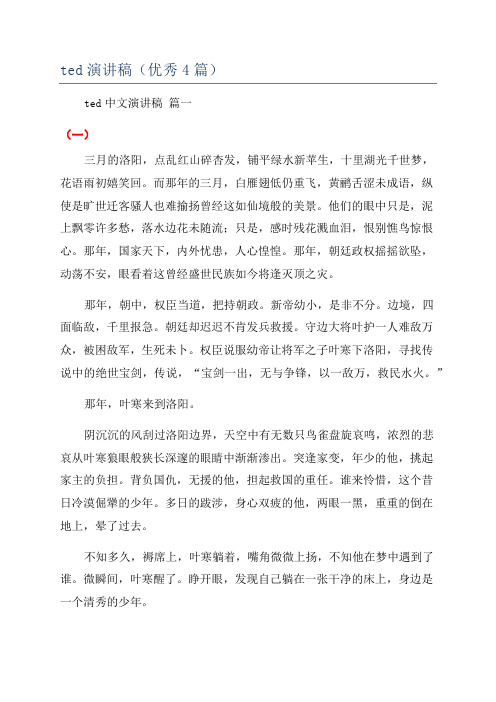
ted演讲稿(优秀4篇)ted中文演讲稿篇一(一)三月的洛阳,点乱红山碎杏发,铺平绿水新苹生,十里湖光千世梦,花语雨初嬉笑回。
而那年的三月,白雁翅低仍重飞,黄鹂舌涩未成语,纵使是旷世迁客骚人也难揄扬曾经这如仙境般的美景。
他们的眼中只是,泥上飘零许多愁,落水边花未随流;只是,感时残花溅血泪,恨别憔鸟惊恨心。
那年,国家天下,内外忧患,人心惶惶。
那年,朝廷政权摇摇欲坠,动荡不安,眼看着这曾经盛世民族如今将逢灭顶之灾。
那年,朝中,权臣当道,把持朝政。
新帝幼小,是非不分。
边境,四面临敌,千里报急。
朝廷却迟迟不肯发兵救援。
守边大将叶护一人难敌万众,被困敌军,生死未卜。
权臣说服幼帝让将军之子叶寒下洛阳,寻找传说中的绝世宝剑,传说,“宝剑一出,无与争锋,以一敌万,救民水火。
”那年,叶寒来到洛阳。
阴沉沉的风刮过洛阳边界,天空中有无数只鸟雀盘旋哀鸣,浓烈的悲哀从叶寒狼眼般狭长深邃的眼睛中渐渐渗出。
突逢家变,年少的他,挑起家主的负担。
背负国仇,无援的他,担起救国的重任。
谁来怜惜,这个昔日冷漠倔犟的少年。
多日的跋涉,身心双疲的他,两眼一黑,重重的倒在地上,晕了过去。
不知多久,褥席上,叶寒躺着,嘴角微微上扬,不知他在梦中遇到了谁。
微瞬间,叶寒醒了。
睁开眼,发现自己躺在一张干净的床上,身边是一个清秀的少年。
“我是言幽,是我救了你。
你的身体很弱,需要休息。
”少年对着叶寒说。
“嗯?恩!”话虽短,却是温暖。
叶寒笑了,这种感觉好像父亲。
“来,喝药。
”黑黢黢的药水,泛着波痕。
叶寒斜觑着言幽,那双眼睛似乎与梦中的人影重叠,一样的光彩熠熠,似夜空中的星,折射出柔和的颜色,却带着点点忧愁。
“父亲……”叶寒低头不知在自语什么。
(二)数月过去,天地景物,宛若迷雾。
山涧四季,水面涟漪,草际烟光,月下花容,杲杲云彩,风中飘逸。
那天晚上,赤橙色的星辰点缀着墨蓝色的天空,夜弥漫着温馨的颜色。
那天山上,磷光莹莹,萤火虫闪着模糊地绿光,连缀起一片绿色,好似夜空的倒影,迷茫而又清晰。
ted十大著名演讲稿
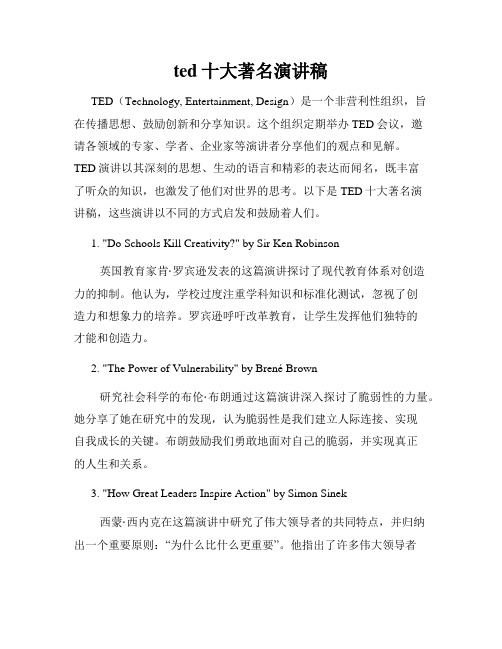
ted十大著名演讲稿TED(Technology, Entertainment, Design)是一个非营利性组织,旨在传播思想、鼓励创新和分享知识。
这个组织定期举办TED会议,邀请各领域的专家、学者、企业家等演讲者分享他们的观点和见解。
TED演讲以其深刻的思想、生动的语言和精彩的表达而闻名,既丰富了听众的知识,也激发了他们对世界的思考。
以下是TED十大著名演讲稿,这些演讲以不同的方式启发和鼓励着人们。
1. "Do Schools Kill Creativity?" by Sir Ken Robinson英国教育家肯·罗宾逊发表的这篇演讲探讨了现代教育体系对创造力的抑制。
他认为,学校过度注重学科知识和标准化测试,忽视了创造力和想象力的培养。
罗宾逊呼吁改革教育,让学生发挥他们独特的才能和创造力。
2. "The Power of Vulnerability" by Brené Brown研究社会科学的布伦·布朗通过这篇演讲深入探讨了脆弱性的力量。
她分享了她在研究中的发现,认为脆弱性是我们建立人际连接、实现自我成长的关键。
布朗鼓励我们勇敢地面对自己的脆弱,并实现真正的人生和关系。
3. "How Great Leaders Inspire Action" by Simon Sinek西蒙·西内克在这篇演讲中研究了伟大领导者的共同特点,并归纳出一个重要原则:“为什么比什么更重要”。
他指出了许多伟大领导者如何通过传达他们对事业的动机和目标来激励行动,并鼓励我们找到属于自己的“为什么”。
4. "The Puzzle of Motivation" by Dan Pink丹·平克在这篇演讲中提出了一个具有启示性的问题:金钱是否是唯一的激励因素?他介绍了科学研究的结果,指出在创造性工作和复杂任务中,金钱奖励反而可能降低动机。
ted最受欢迎的25个演讲稿
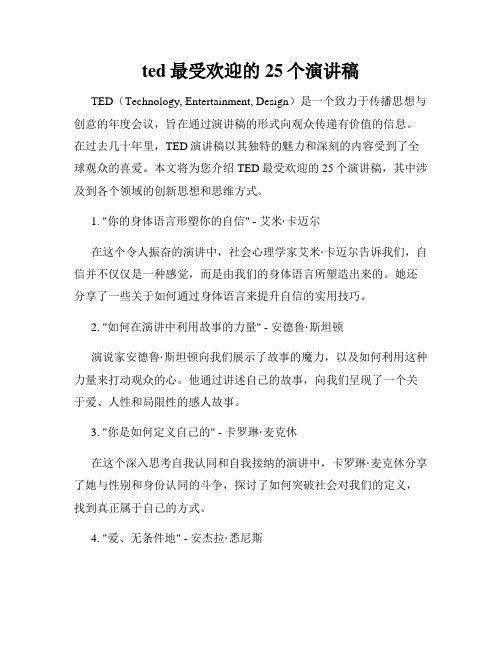
ted最受欢迎的25个演讲稿TED(Technology, Entertainment, Design)是一个致力于传播思想与创意的年度会议,旨在通过演讲稿的形式向观众传递有价值的信息。
在过去几十年里,TED演讲稿以其独特的魅力和深刻的内容受到了全球观众的喜爱。
本文将为您介绍TED最受欢迎的25个演讲稿,其中涉及到各个领域的创新思想和思维方式。
1. "你的身体语言形塑你的自信" - 艾米·卡迈尔在这个令人振奋的演讲中,社会心理学家艾米·卡迈尔告诉我们,自信并不仅仅是一种感觉,而是由我们的身体语言所塑造出来的。
她还分享了一些关于如何通过身体语言来提升自信的实用技巧。
2. "如何在演讲中利用故事的力量" - 安德鲁·斯坦顿演说家安德鲁·斯坦顿向我们展示了故事的魔力,以及如何利用这种力量来打动观众的心。
他通过讲述自己的故事,向我们呈现了一个关于爱、人性和局限性的感人故事。
3. "你是如何定义自己的" - 卡罗琳·麦克休在这个深入思考自我认同和自我接纳的演讲中,卡罗琳·麦克休分享了她与性别和身份认同的斗争,探讨了如何突破社会对我们的定义,找到真正属于自己的方式。
4. "爱、无条件地" - 安杰拉·悉尼斯人类关系专家安杰拉·悉尼斯在这个感人至深的演讲中讨论了爱的力量。
她提醒我们,在日常生活中给予他人和自己无条件的爱是多么重要,而这种爱可以改变整个世界。
5. "追寻真理的重要性" - 朱莉安·特雷斯朱莉安·特雷斯是一位经济学家,她在这个演讲中思考了关于真理和谎言的问题。
她敦促我们在信息过载的时代保持质疑的态度,追求真相,并且不断反思自己的观点。
6. "教育革命" - 肯·罗宾逊肯·罗宾逊是一位著名的创新教育家,他在这个演讲中分享了他对传统教育系统的批评,并提出了一些关于如何改变教育的新思路。
演讲稿 简短的ted演讲稿
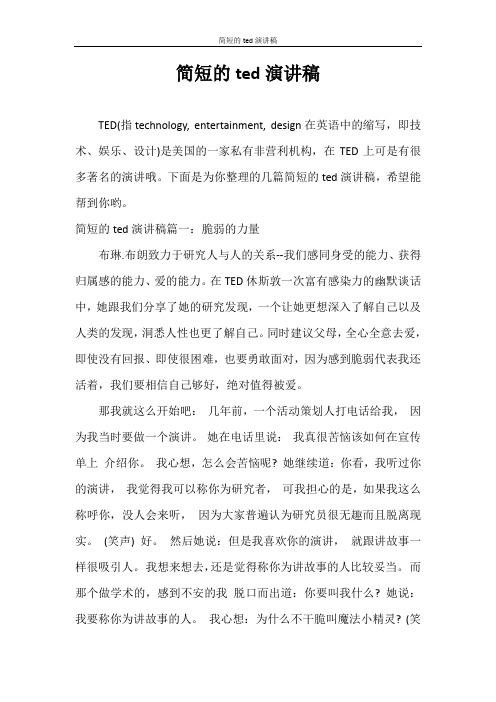
简短的ted演讲稿TED(指technology, entertainment, design在英语中的缩写,即技术、娱乐、设计)是美国的一家私有非营利机构,在TED上可是有很多著名的演讲哦。
下面是为你整理的几篇简短的ted演讲稿,希望能帮到你哟。
简短的ted演讲稿篇一:脆弱的力量布琳.布朗致力于研究人与人的关系--我们感同身受的能力、获得归属感的能力、爱的能力。
在TED休斯敦一次富有感染力的幽默谈话中,她跟我们分享了她的研究发现,一个让她更想深入了解自己以及人类的发现,洞悉人性也更了解自己。
同时建议父母,全心全意去爱,即使没有回报、即使很困难,也要勇敢面对,因为感到脆弱代表我还活着,我们要相信自己够好,绝对值得被爱。
那我就这么开始吧:几年前,一个活动策划人打电话给我,因为我当时要做一个演讲。
她在电话里说:我真很苦恼该如何在宣传单上介绍你。
我心想,怎么会苦恼呢? 她继续道:你看,我听过你的演讲,我觉得我可以称你为研究者,可我担心的是,如果我这么称呼你,没人会来听,因为大家普遍认为研究员很无趣而且脱离现实。
(笑声) 好。
然后她说:但是我喜欢你的演讲,就跟讲故事一样很吸引人。
我想来想去,还是觉得称你为讲故事的人比较妥当。
而那个做学术的,感到不安的我脱口而出道:你要叫我什么? 她说:我要称你为讲故事的人。
我心想:为什么不干脆叫魔法小精灵? (笑声) 我说:让我考虑一下。
我试着鼓起勇气。
我对自己说,我是一个讲故事的人。
我是一个从事定性研究的科研人员。
我收集故事;这就是我的工作。
或许故事就是有灵魂的数据。
或许我就是一个讲故事的人。
于是我说:听着,要不你就称我为做研究兼讲故事的人。
她说:哈哈,没这么个说法呀。
(笑声) 所以我是个做研究兼讲故事的人,我今天想跟大家谈论的-- 我们要谈论的话题是关于拓展认知-- 我想给你们讲几个故事是关于我的一份研究的,这份研究从本质上拓宽了我个人的认知,也确确实实改变了我生活、爱、工作还有教育孩子的方式。
TED英文演讲稿3篇_英语演讲稿_
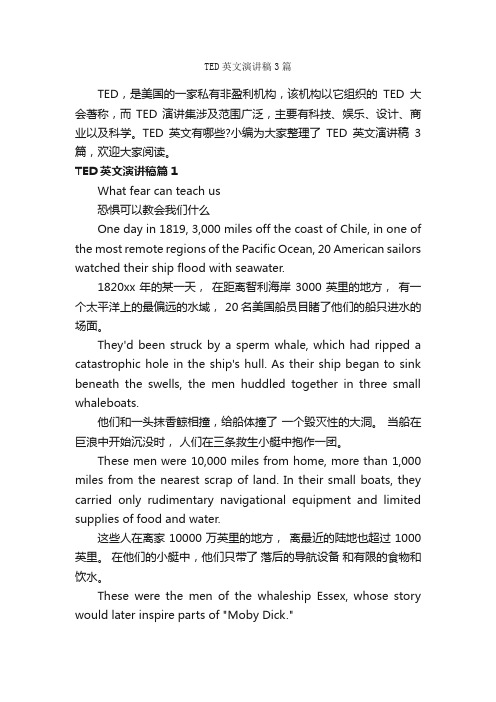
TED英文演讲稿3篇TED,是美国的一家私有非盈利机构,该机构以它组织的TED大会著称,而TED演讲集涉及范围广泛,主要有科技、娱乐、设计、商业以及科学。
TED英文有哪些?小编为大家整理了TED英文演讲稿3篇,欢迎大家阅读。
TED英文演讲稿篇1What fear can teach us恐惧可以教会我们什么One day in 1819, 3,000 miles off the coast of Chile, in one of the most remote regions of the Pacific Ocean, 20 American sailors watched their ship flood with seawater.1820xx年的某一天,在距离智利海岸3000英里的地方,有一个太平洋上的最偏远的水域, 20名美国船员目睹了他们的船只进水的场面。
They'd been struck by a sperm whale, which had ripped a catastrophic hole in the ship's hull. As their ship began to sink beneath the swells, the men huddled together in three small whaleboats.他们和一头抹香鲸相撞,给船体撞了一个毁灭性的大洞。
当船在巨浪中开始沉没时,人们在三条救生小艇中抱作一团。
These men were 10,000 miles from home, more than 1,000 miles from the nearest scrap of land. In their small boats, they carried only rudimentary navigational equipment and limited supplies of food and water.这些人在离家10000万英里的地方,离最近的陆地也超过1000英里。
ted演讲稿大全
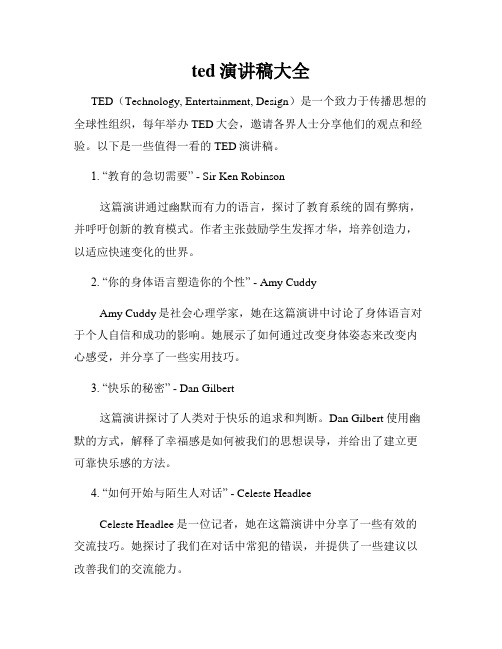
ted演讲稿大全TED(Technology, Entertainment, Design)是一个致力于传播思想的全球性组织,每年举办TED大会,邀请各界人士分享他们的观点和经验。
以下是一些值得一看的TED演讲稿。
1. “教育的急切需要” - Sir Ken Robinson这篇演讲通过幽默而有力的语言,探讨了教育系统的固有弊病,并呼吁创新的教育模式。
作者主张鼓励学生发挥才华,培养创造力,以适应快速变化的世界。
2. “你的身体语言塑造你的个性” - Amy CuddyAmy Cuddy是社会心理学家,她在这篇演讲中讨论了身体语言对于个人自信和成功的影响。
她展示了如何通过改变身体姿态来改变内心感受,并分享了一些实用技巧。
3. “快乐的秘密” - Dan Gilbert这篇演讲探讨了人类对于快乐的追求和判断。
Dan Gilbert使用幽默的方式,解释了幸福感是如何被我们的思想误导,并给出了建立更可靠快乐感的方法。
4. “如何开始与陌生人对话” - Celeste HeadleeCeleste Headlee是一位记者,她在这篇演讲中分享了一些有效的交流技巧。
她探讨了我们在对话中常犯的错误,并提供了一些建议以改善我们的交流能力。
5. “领导的力量” - Simon SinekSimon Sinek提出了一个引人思考的问题:“为什么我们做什么比我们做什么更重要?”他通过分享一些成功领导者的例子,说明了领导力的真正力量。
6. “勇于演讲” - Caroline Goyder这篇演讲旨在帮助人们克服公众演讲的恐惧。
Caroline Goyder分享了一些有关如何利用语气、呼吸和肢体语言来提高演讲效果的技巧。
7. “与孤独共舞” - Susan CainSusan Cain是《内向力量》的作者,她在这篇演讲中强调内向者在社会中的重要性。
她提醒我们需要给予内向者更多的空间和理解,以实现真正的创意和创新。
8. “如何谈话让人思考” - Celeste HeadleeCeleste Headlee在这篇演讲中分享了一些有关有效对话的技巧,包括倾听、尊重和关注每个参与者的观点。
ted十大著名演讲稿
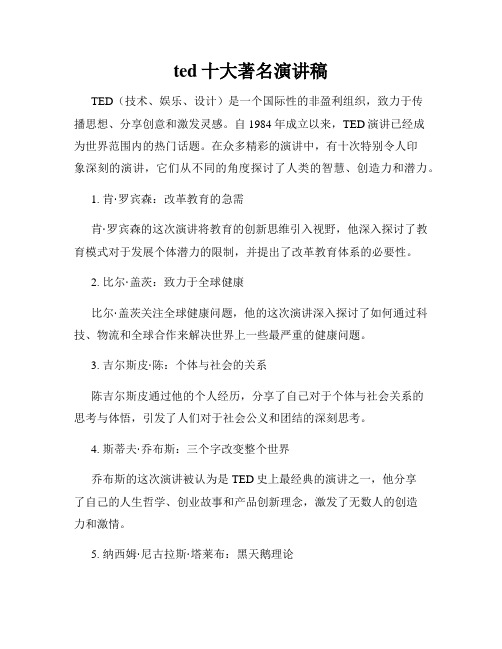
ted十大著名演讲稿TED(技术、娱乐、设计)是一个国际性的非盈利组织,致力于传播思想、分享创意和激发灵感。
自1984年成立以来,TED演讲已经成为世界范围内的热门话题。
在众多精彩的演讲中,有十次特别令人印象深刻的演讲,它们从不同的角度探讨了人类的智慧、创造力和潜力。
1. 肯·罗宾森:改革教育的急需肯·罗宾森的这次演讲将教育的创新思维引入视野,他深入探讨了教育模式对于发展个体潜力的限制,并提出了改革教育体系的必要性。
2. 比尔·盖茨:致力于全球健康比尔·盖茨关注全球健康问题,他的这次演讲深入探讨了如何通过科技、物流和全球合作来解决世界上一些最严重的健康问题。
3. 吉尔斯皮·陈:个体与社会的关系陈吉尔斯皮通过他的个人经历,分享了自己对于个体与社会关系的思考与体悟,引发了人们对于社会公义和团结的深刻思考。
4. 斯蒂夫·乔布斯:三个字改变整个世界乔布斯的这次演讲被认为是TED史上最经典的演讲之一,他分享了自己的人生哲学、创业故事和产品创新理念,激发了无数人的创造力和激情。
5. 纳西姆·尼古拉斯·塔莱布:黑天鹅理论塔莱布以系统性的思维和独特的视角,阐述了黑天鹅事件在世界演变中的重要性,引发了人们对于不确定性和未知事物的思考。
6. 爱丽丝·丽弗斯:暴力行为的若干可能解决方案丽弗斯从个体到全球的角度,以她在儿童健康和反暴力方面的研究为基础,提出了一些解决暴力问题的可能途径,呼吁人们共同努力。
7. 大卫·希弗:统计的力量希弗用幽默和温馨的语言,向人们介绍了统计学的魅力和实用性,引发了人们对于数据和信息处理的思考。
8. 基恩·罗宾逊:才能的快乐罗宾逊通过幽默和感人的故事,传达了每个人都是独特的,每个人都有自己的才能和潜力,鼓励人们追求自己的兴趣和热情。
9. 萨拉·基耶莉尼:我们所惧怕的穷人基耶莉尼以她在计划生育和贫困问题上的工作经验,深入探讨了如何理解和帮助世界上那些极度贫困的人群。
ted精选英语演讲稿

TED精选英语演讲稿演讲稿一:How to Be Your Best SelfIntroductionGood morning, ladies and gentlemen. I am honored to stand before you today and share with you some important insights on how to be your best self. In a world that is constantly changing and evolving, it is crucial that we strive to become the best version of ourselves.Body1. Embrace Self-AcceptanceThe first step towards becoming your best self is to embrace self-acceptance. We are all unique individuals with our own strengths and weaknesses. Instead of comparing ourselves to others, we should focus on accepting and loving ourselves for who we are. Embracing self-acceptance allows us to build a solid foundation of self-confidence and enables us to pursue our goals with passion and determination.2. Set Goals and Take ActionSetting goals is essential for personal growth. By setting goals, we give ourselves something to strive for and a sense of direction in life. However, setting goals alone is not enough. We must also take action towards achieving these goals. Taking action requires discipline, perseverance, and a willingness to step out of our comfort zones. It is through the pursuit of our goals that we truly become our best selves.3. Cultivate a Growth MindsetA growth mindset is the belief that our abilities and intelligence can be developed through hard work, dedication, and learning from failures. Cultivating a growth mindset allows us to view challenges as opportunities for growth rather than obstacles to overcome. By embracing a growth mindset, we become more resilient, adaptable, and open to new experiences. This mindset is essential for personal development and becoming our best selves.4. Practice Self-CareIn our fast-paced and demanding lives, it is easy to neglect our own well-being. However, self-care is vital for our overall happiness and success. Engaging in activities that promote physical, mental, and emotional well-being allows us to recharge, reduce stress, and increase our productivity. Whether it is through exercise, meditation, spending time with loved ones, or pursuing a hobby, self-care should be prioritized in order to become our best selves.ConclusionIn conclusion, becoming your best self is a lifelong journey that requires self-acceptance, goal-setting, action-taking, cultivating a growth mindset, and practicing self-care. By embracing these principles and consistently working towards personal growth, we can unlock our full potential and lead fulfilling lives. Remember, the road to becoming your best self may not always be easy, but it is definitely worth the effort. Thank you.演讲稿二:The Power of PositivityIntroductionGood afternoon, everyone. Today, I want to talk to you about the power of positivity. In a world that is often filled with negativity and pessimism, it is important to understand the impact that positivity can have on our lives.Body1. The Benefits of PositivityPositive thinking has been linked to numerous benefits, both for our mental and physical well-being. Studies have shown that optimistic individuals tend to have lower levels of stress, improved immune function, and increased resilience in the face of adversity. Furthermore, positivity can enhance our relationships, boost our creativity, and improve our overall quality of life.2. Cultivating a Positive MindsetCultivating a positive mindset requires conscious effort and practice. One way to do this is by reframing negative thoughts and focusing on the positive aspects of a situation. For example, instead of dwelling on a failure, we can view it as a learning opportunity and a stepping stone towards success. Additionally, surrounding ourselves with positive influences, such as supportive friends and uplifting media, can also contribute to a more positive outlook on life.3. The Power of GratitudeGratitude is another powerful tool for cultivating positivity. Taking the time to appreciate the things we have and express gratitude for the people in our lives can help shift our focus from what is lacking to what is abundant. Gratitude not only enhances our well-being but also strengthens our relationships and fosters a sense of contentment and fulfillment.4. Spreading PositivitySharing positivity with others is a beautiful way to make a difference in the world. Acts of kindness, encouragement, and genuine compliments can brighten someone’s day and create a ripple effect of positivity. By spreading positivity, we not only uplift others but also contribute to a more harmonious and compassionate society.ConclusionIn conclusion, positivity has the power to transform our lives. By cultivating a positive mindset, practicing gratitude, and spreading positivity to others, we can experience the many benefits that come with embracing positivity. Let us be the change we wish to see in the world and make a conscious effort to choose positivity in every aspect of our lives. Thank you.。
- 1、下载文档前请自行甄别文档内容的完整性,平台不提供额外的编辑、内容补充、找答案等附加服务。
- 2、"仅部分预览"的文档,不可在线预览部分如存在完整性等问题,可反馈申请退款(可完整预览的文档不适用该条件!)。
- 3、如文档侵犯您的权益,请联系客服反馈,我们会尽快为您处理(人工客服工作时间:9:00-18:30)。
人际关系的潜在影响
演讲者与同伴做了一项研究,数据显示如果你的朋友们有肥胖症,你肥胖的可能性就会高出45%。
;如果你的朋友的朋友有肥胖症,你患肥胖症的可能性就会高出25%;如果你朋友的朋友的朋友──你可能都不认识这个人──患有肥胖症的话,你患肥胖症的可能性就会高出10%;一直追溯到你朋友的朋友的朋友的朋友的时候,这层关系才会消失,这个人的身形和你的身形才不再会有关联。
造成这种聚集的原因有哪些呢?至少有三种可能。
第一种类似磁场感应,当我体重增加时,也导致了你的体重增加,由一个人传到另一个人。
另一种可能是聚合效应,物以类聚、人以群分。
最后一种可能是混杂因素,模糊以至于找不到真正的原因,可能是相同的经历,比如一起减肥。
进一步研究这些数据的时候,我们发现了支持这些可能的证据,一种可能是朋友的增肥行为传染了你,另一个潜在的可能性是标准的改变。
经过五年的跟踪研究,我们发现肥胖者和非肥胖者在这个网络中出现扎堆的现象。
通过这个演示,我们能知道这个随时间而变换的网络,是有记忆的,它移动着,其中的事物随其所动,它拥有着一种持久性;其中的人也许死去,但这种网络却不会死去,它仍旧持续着。
它有着一种坚韧性,允许它恒久不变。
演讲者做的第二项类似的研究是关于情感。
同样一个社会网络中,你立马就能看到快乐的人和不快乐的人扎堆出现,同样地是传递到三层分离关系。
这个网络有个中心部分、有个边缘地带,而不快乐的人好像都集中在边缘地带。
把这个网络结构分解一下,注意到每个人在这个网络中的结构点和看似其他人都是一样的,其实完全不同。
不同的结构点对你的人生有着不同的影响。
我们不得不猜想,也许社会网路的形成基本原因与我们的基因中有关。
朋友多或少、朋友之间是否相互认识、我们处于网络的中心点或是边缘地带,都与我们自身的基因有关。
人类对内感受情感,对外展示情感,阅读并且容易复制别人的情感。
情感这种最原始的表达方式也在通过社会网络相互传染。
事实上,情感是有一种共有的存在性,不单单是个人的存在性。
事实证明,吸烟和喝酒行为,投票行为,离婚、自闭症等等也是可以通过社会网络传染的。
演讲者在开篇提到了“寡妇效应”,并且强调”寡妇效应”不局限于丈夫和妻子之间,也不局限于两个人。
人与人成双成对,又由于其他各种人际关系──婚姻、伴侣、友情等等,再通过不断的两两相配,形成一个精致、错综复杂、无所不在的社会网络。
我们所有人都身处在这个广博的网络中,与彼此相连。
我们是如何陷入这些社会网络中,这些网络是如何影响我们的生活?它们存在的意义是什么?
这些社会网络充满价值,好比一种社交资产。
由于我们身陷其中,新的网络属性会出现,而这些属性是继承在网络的结构之中,不仅仅是在网络中的个人身上。
柔软而漆黑的石墨与坚硬而透彻的钻石,同样是由碳原子构成,而这些柔软、坚硬、漆黑和透彻的属性并不是存在于碳原子本身中,而是存在于碳原子之间的联系中,或者至少是由于这些联系造成的。
同样的,人与人之间的关联形态也是赋予了各组群不同的属性。
正是人与人之间的关联使得这个世界要比单单各部分的总和伟大许多。
所以不仅仅是这些人所经历的事情──他们在减肥还是在增肥,在变富还是在变穷,在快乐还是在
不快乐──影响着我们;同时影响我们的还有我们彼此关系所组成的实质结构。
我们在这个世界的经历取决于我们所处网络的实质结构,以及流动于这个网络中的各种事物。
我们通过对社会网络的理解,研究它们是如何构成和运行的,能够帮助我们了解的不仅仅是健康和情感,还有许多其他的现象,比如犯罪和福利,或是经济现象,比如银行挤兑和市场崩盘,对于创新的适应、新技术的引用以及新产品使用的扩展等。
我们组建社会网络是因为人与人相连的生活模式总是利大于弊的。
如果我总是对你很暴力给你错误的信息,或是使你难过,或是让你染上致命的疾病,你就会和我断交,这个网络也就会瓦解,所以好的、有价值的事物的传播是维持、滋润社会网络的必要条件。
同样的,社会网络也是传播这些好的、有价值的事物的必要条件,比如关爱与慈悲,快乐和博爱、新创意等等。
事实上,如果我们可以意识到社会网络的价值所在,我们将会花费更多的时间来培养、维持它们,因为社会网络在本质上是与美好相连的,而我们这个世界上所需要的,正是相互间更多的关联。
